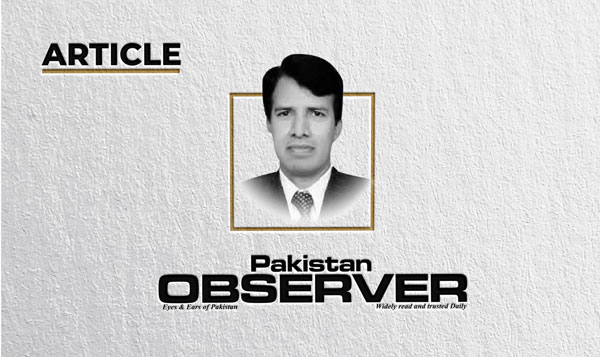Pakistan needs good governance
With respect to good governance, the formative years of Pakistan were quite encouraging than what is being witnessed today after seventy-five years of our history.
Rather bringing improvement and reforms, unfortunately there has been a gradual down-fall in the governance system in Pakistan.
This is unusual and shocking aspect as generally observed states find difficulties in their formative years to ensure good governance mainly because of lack of requisite resources,institutional issues and needed expert manpower.
The domestic challenges facing Pakistan today are direct outcome of the poor governance system.
Indeed, lack of good governance produces vulnerabilities at social level and angst among the masses which are exploited by the rival powers through their spying networks.
The globally agreed definition of governance includes the process of decision making and the process through which decisions are implemented.
The good governance on the other hand is an advanced form of the governance, in which state and its institutions meet the needs of the masses and society in a more proficient manner.
Good governance can be best ensured through optimum utilization of the resources, available at the disposal of state to benefit its masses while securing the national interests of the state.
However, mere availability of the resources in a country is one aspect.
Resources provide the government and its institutions, the leverage needed to make proficient use of them for the good of state and its masses.
The real test of the governance is exploring the resources and subsequently making best use of them for the advantage of its masses.
In Pakistan, there have been fewer efforts by the successive governments for exploring the available resources and making their judicious use for the masses of Pakistan.
As witnessed in past few decades, there has been institutional decay in Pakistan, rather their uplifting and development.
Indeed, institutions play the central role towards good governance. In the absence of good governance, there appeared much vulnerability hurting the state and its masses as practiced and witnessed today.
Advent of multiple divergences based on; ethnicity, sectarianism, factionalism and many other dissipating factors are the outcome of a wanting good governance.
Besides, the ‘existence of massive corruption, lack of accountability, institutional clashes, constitutional crisis, failure of justice system, poor law and order conditions’ all have their origin in the bad governance or at least absence of good governance.
The element of corruption has deeply embedded into the state’s apparatus and most of the state’s institutions, badly affecting the society through a top-down approach.
Over the last three decades, this undesired element has created a state of insecurity and chaos among the masses.
Since the evil has its origin in the elite class (the ruling few) therefore, corrective measures were wrongly traced at the bottom bulk (the masses).
They just had to follow their bosses, who neither considered it as an immoral act nor ever tried to stop it.
Today this evil is deep-rooted with many forms and manifestations; difficult to be removed from state and society alike where each blaming the other and no one ready to abandon it.
Since bulk of the elite class and their cronies are product of this corruption, therefore no one is ready to undergo an accountability process.
Whatever being witnessed today is nothing else other than the cosmetic and rhetoric. The unfortunate part of this entire episode is the rhetoric being played in the most unprofessional manner.
While accusing the rivals, the former rulers (still elites) and contemporary elites blame each other for corruption, mismanagement, lootings, poor governance and falsification but, no one is ready for accountability.
The process of accountability has been used for political targeting the rivals without any tangible achievements.
The elites in Pakistan forget that, they have some responsibilities towards state, masses and more so to bring reforms in the system for impartial accountability.
They do not do it since they have to take a term, enjoy the perks and privileges and befool the masses by accusing the previous ones.
Practically what is happening; rather working for the state and masses through promised reliefs and good governance, a mess is created for personal/ party gains in the name of accountability.
Today, the people of Pakistan are being grilled through exceptional high prices, where the essential commodities needed for the masses are beyond their purchasing power.
This price hike has never been witnessed in the history of Pakistan, even during or after 1971 war or after imposition of economic sanctions, sequel to 1998 nuclear blasts.
This is indeed the worst example of exploiting the masses in the name of so-called people’s government and democracy.
The Pakistani Rupeehas been devalued to a level which is unprecedented and indeed seems a deliberate act.
Pakistan is left with less than $10 billion foreign currency reserves and Pakistani Rupee has been devalued to a level of; $1=Rs 240.
Politically and economically, Pakistan is passing through a difficult time of its history. People of Pakistan are sick off from the fake promises and phony dreams.
They want; rule of law, unbiased justice system, cheap availability of food items, end of social exploitation and restoration of national pride and prestige without over-burdening the state through foreign loans.
This all can be ensured through good governance which is not visible anywhere in Pakistan.
— The writer is Professor of Politics and IR at International Islamic University, Islamabad.









